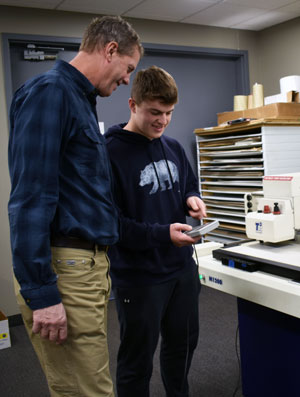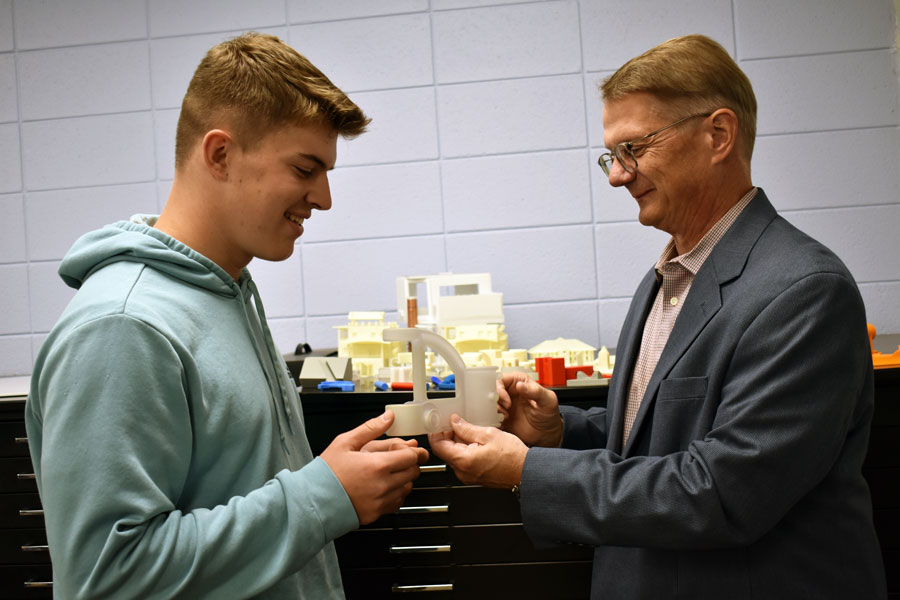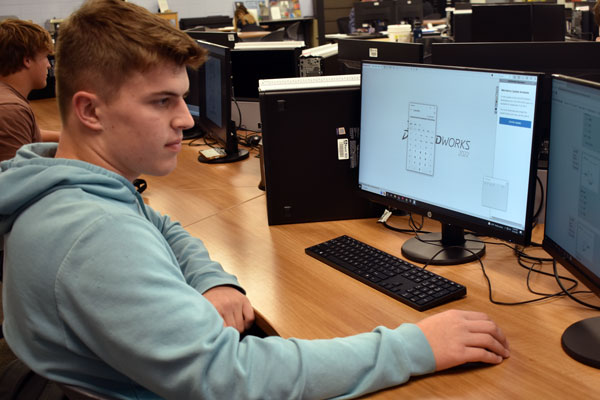Kent ISD — There’s been a time or two that Isaac Clark has held a Tim Hortons doughnut box and wondered if it came from one of the dies he created.
The Caledonia senior, who also is an engineering and architectural design student at Kent Career Tech Center, spent the summer building dies at Kentwood’s Michigan Lasercut and is now an intern there, making patterns for dies used to cut the boxes for candies like Milk Duds, McDonald’s happy meals, and Tim Hortons goodies.
“When I thought about engineering, especially mechanical engineering, I thought of more, like, gears and motors — pretty much cars,” Isaac said. “I never thought of it for packaging, such as creating a box.”
It’s not an uncommon perception, and part of the reason Steve Schroder, president of Michigan Lasercut, said he decided to offer an internship.

Building a Talent Pipeline
Michigan Lasercut is a tool and die company for printing and packaging. In making the packaging, the company produces three different dies: the first cuts the box shape, the second strips or removes the scrap, and the third die, which is blanking, pushes the final product out.
Patterns for each of these dies have to be created and produced for the dies to be built.
“As I looked around my shop, I could see that our employees were getting older and starting to age out of the workforce,” Schroder said, adding that he found that the next generation was not aware of or looking for jobs in the technical fields like the ones Michigan Lasercut offers.
Schroder wanted to help develop an interest and encourage students, so he reached out to Kent Career Tech Center and was connected with a couple of teachers including Lawrence Ridley, the Tech Center’s engineering and architectural design instructor.
“The internships, for those students with the skill level and attendance for employers to consider, allows the students to increase their experience in an actual real-world job, where they learn and increase the application of the skills they have built in the program,” said Ridley. Some have become full-time employees after their internships, or work in the summers while attending college.
For students, internships like at Michigan Lasercut not only offer them the opportunity to get paid for something they’re interested in, but teaches them how to interact with co-workers, meet deadlines and manage their time.
“I think there is a lot more opportunity working here than a student just getting a job at a fast-food restaurant,” Schroder said. “You are not only earning money, but you are also developing a skill in something that you enjoy.”

Learning the Pins: Ejector, Core and More
Schroder said it is key for students to learn how to build dies before working on patterns.
“I think working in the shop was helpful, because it gave me a better understanding about how the die was constructed,” said Isaac, who spent the summer building dies. “You have to be careful where the (guide) pins are, so as to make sure the right shape is created.
“I really did not realize how complicated it can be to create a box.”
His internship started in the fall. He attends the Tech Center two days a week, and is at Michigan Lasercut the other three.
“I did visit the workplace, because I want to make sure that we match them with the right student,” Ridley said. “Isaac is a good fit. He is hardworking and not afraid to get his hands dirty. He is a good designer.”
Currently, Isaac works on the first die, which cuts the box shape. The designs get more complicated as the box proceeds through the system. Isaac will have worked at all levels of the process before his internship concludes next spring, Schroder said.
His Passion: Making Stuff
Isaac can trace his interest in engineering back to fifth grade, when he participated in Vex Robotics, a program for elementary to university students.
“It has always been a favorite subject, being able to see the ways of how stuff is made and making stuff,” he said.
In high school, he decided to continue exploring via the Tech Center, which he said has allowed him to explore different types of engineering. One was being able to work with SolidWorks, a solid modeling computer-aided design (CAD) and computer-aided engineering (CAE) application published by Dassault Systèmes, a French software company.
He plans to pursue industrial design after graduation, which will let him continue to work with SolidWorks, instead of mechanical engineering.
“I really like the idea of putting it on the computer and then holding the model in my hand,” Isaac said.










